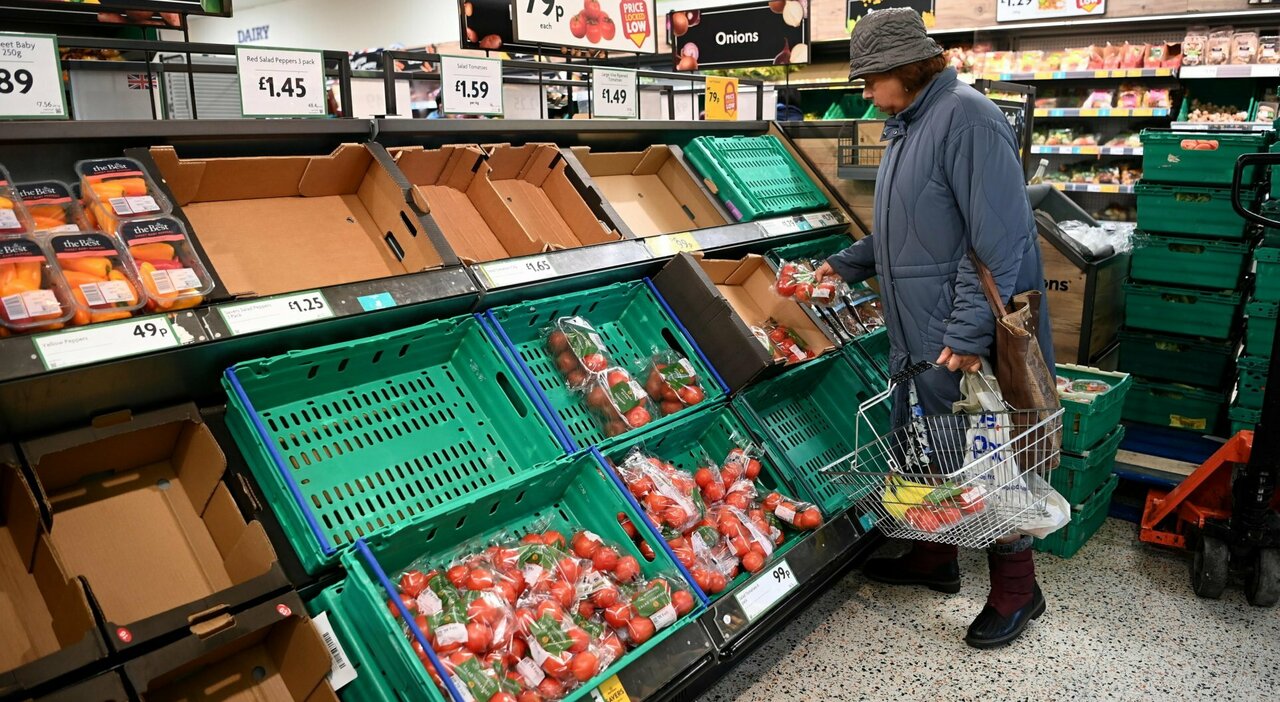Shortage of fruit and vegetables in Great Britain and large-scale distribution in trouble– The number of British supermarket chains forced to deal with the shortage of some vegetables traditionally imported to the island in winter rises to 4 Nord Africa or from Southern Spain con temporary forms of rationing. After the announcement of the past few days of Asda, Morrisons and Tescotoday came to Lidlleader of the low-cost large-scale distributionwhich it has in turn decided to limit to the quantity of product that can be purchased is three packs per customer: limited to tomatoes, peppers and cucumbers. Limits have also been triggered for lettuce, salads, broccoli, cauliflower and raspberries. These are the rationed and least available products at the moment.
The empty shelves alarm, although limited to some types of vegetables and much less present in small shops or markets, re-proposed situations that had already occurred in the recent past: and indicated then, at least in part, as consequence of post-Brexit trade barriers. In reality according to the analyzes of some experts, the spokespersons of trade organizations and media such as the BBC, however, the problem would have to do more than anything else with the scarce availability upstream in the producing countries caused by irregular climatic phenomena and exceptionally bad weather hit this season on crops. On the other hand, this is what the British government has also declared: bad weather in Africa and Europe is causing the fruit and vegetable distribution chain to explode. But there are other factors that contribute to the “shortages”.
Goodbye low-cost flights? Ryanair CEO: “Prices will rise over the next five years”
Climate and energy cost
In fact, it seems more a combination of factors that together cause the phenomenon of empty shelves in supermarkets. You can’t in fact overlook it too the impact of high electricity prices on produce grown in glasshouses in the UK and the Netherlands.
The Asda Catena has limited sales to three per customer lettuces, salads, broccoli, cauliflower and raspberriesas well as tomatoes, peppers and cucumbers. Morrisons set a limit of two for cucumbers, tomatoes, lettuces and peppers. Former Sainsbury’s chief executive Justin King told the BBC that limits were placed to prevent other retailers from buying up the stock: «Even greengrocers on the High Street, when they can’t get supplies from wholesalers, start buying from supermarket shelves».
Why this shortage?
According to the British Retail Consortium (BRC), in the winter months the UK imports around 95% of tomatoes and 90% of lettuces, mostly from Spain and North Africa. But weather disrupted plans: southern Spain suffered unseasonably cold weather and crops in Morocco were affected by flooding, while storms caused ferry delays or cancellations. The phenomenon of shortages has hit the first link in the chain, in Africa. Earlier this month, Morocco has blocked exports of tomatoes, onions and potatoes to West African countriesin an attempt to protect exports to Europe.
However, the vegetables and fruit available in the United Kingdom also come from domestic cultivation and from the Netherlands. But even those are not enough to supply supermarkets as farmers in both countries have reduced the use of greenhouses for winter crops due to rising electricity prices. And so it turns out that three-quarters of UK cucumber and pepper crops have delayed planting due to high energy costs.
The National Farmers Union has called for more support for British farmers and has complained that the sector has not been included in the government’s support program for energy-intensive industries. Farmers’ unions are forecasting bleakly and say shortages could continue into May.
But then does Brexit have something to do with it, yes or no?
The narrative is that the British referendum to leave Europe is the main driver of the shortages yet problems have also been reported in Ireland, which is part of the EU. Brexit, and the trade barriers it has imposed on the exchange of products, does not appear to be a determining factor, therefore. Brexit affects the fresh produce sector when workers from EU countries need to be employed. But, even this problem is solved by the new permit system for seasonal workers.
Ksenija Simovic, senior policy adviser to Copa-Cogeca, a group representing EU farmers and agri-cooperatives, told the BBC that Brexit isn’t the main reason, but it didn’t help. Why? Because European companies benefit both from the proximity to the places where the products are grown, and from simpler and better coordinated supply chains. Simovic has therefore come to a fairly clear conclusion: if there is a shortage of supply, the products available are more likely to remain within the single market.
“It’s cheaper for a supplier to source in the Netherlands and other northern countries because he doesn’t have to negotiate the 25-mile English Channel, which adds a cost,” he told Euronews. Chris White, director of Fruit Net, who explained that dealing with the additional costs and bureaucracy imposed by Brexit to get fresh fruit and vegetables across the Channel is clearly proving overpriced for some producers, which is why the tomatoes reach supermarkets in France, Belgium or the Netherlands, but not in Great Britain.
Read the full article
on The Messenger
